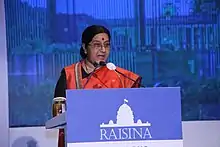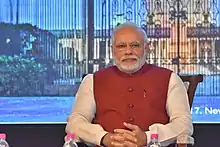Raisina Dialogue
The Raisina Dialogue is a multilateral conference held annually in New Delhi, India. Since its inception in 2016, the conference has emerged as India’s flagship conference on geopolitics and geo-economics. The conference is hosted by the Observer Research Foundation, an independent think tank, in collaboration with the Ministry of External Affairs of India.
The conference is structured as a multi-stakeholder, cross-sectoral discussion, involving a variety of global policymakers including heads of state, cabinet ministers and local government officials. In addition, the Dialogue also welcomes major private sector executives, as well as members of the media and academia. It is designed on the lines of Singapore's Shangri-La Dialogue.[1]
The name "Raisina Dialogue" comes from Raisina Hill, an elevation in New Delhi, seat of the Government of India, as well as the Presidential Palace of India, Rashtrapati Bhavan.[2]
Raisina Dialogue 2016

The first Raisina Dialogue was held from March 1–3, 2016. Over 100 speakers from over 35 countries attended to speak on the theme, “Asia: Regional and Global Connectivity”. The focus of the 2016 conference was on Asia’s physical, economic, human and digital connectivity. Panels and discussions explored opportunities and challenges for the region to manage its common spaces, as well as the global partnerships needed to develop common pathways in this century.
Following the inaugural conference, the news media lauded the event as “packing a global punch in Delhi”.[3] The conference report can be found online.

Raisina Dialogue 2017
In 2017, The Dialogue was held from January 17–19. Held on a larger scale, the conference welcomed over 120 speakers from 65 countries and upwards of 800 participants. Attendees discussed the theme, “The New Normal: Multilateralism with Multipolarity”. The Prime Minister of India, Narendra Modi, inaugurated the 2017 edition of the Raisina Dialogue. Other eminent speakers included the former President of Afghanistan, Hamid Karzai; the former Prime Minister of Canada, Stephen Harper; Nepal’s Minister of Foreign Affairs, Prakash Sharan Mahat; U.K.’s Secretary of State for Foreign & Commonwealth Affairs, Boris Johnson; the Diplomatic Adviser to the President of France, Jacques Audibert; Commander of U.S. Naval Forces, Europe and Africa, Admiral Michelle Howard; Commander of U.S. Pacific Command, Admiral Harry Harris, Jr.; and the Indian Chief of the Army Staff, General Bipin Rawat. The conference report can be found online.[4]
Raisina Dialogue 2018
The third edition of The Raisina Dialogue was held at the Taj Diplomatic Enclave in New Delhi, India from January 16–18, 2018.
The theme for the 2018 Conference is “Managing Disruptive Transitions: Ideas, Institutions and Idioms”. This theme is designed to explore the shifting dynamics within the global order; where old relationships need new directions, emerging partnerships face unprecedented constraints and the notions of power and sovereignty are challenged. The Dialogue will foster discussion on the role of institutions, the possibility of collective action and successful responses to these modern developments.[5]
Raisina Dialogue 2018 was attended by following scholars and officials:[6]
| Name | Designation | Country |
|---|---|---|
| Narendra Modi | Prime Minister of India | |
| Sushma Swaraj | Foreign Minister of India | |
| S Jaishankar | Foreign Secretary (India) | |
| Sunjoy Joshi | Chairman, Observer Research Foundation | |
| Benjamin Netanyahu | Prime Minister of Israel | |
| Konstantin Kosachev | Chair of the Foreign Affairs Committee of the Federation Council | |
| Hans Dahlgren | State Secretary for International and EU Affairs to Prime Minister | |
| David Malone | Rector, United Nations University | |
| Jayant Sinha | Ministry of Civil Aviation (India) | |
| Gabriela Ramos | OECD Chief of Staff and Sherpa to the G20 | |
| Joseph Lubin | Founder, ConsenSys | |
| Stavros N. Yiannouka | CEO, World Innovation Summit for Education | |
| Peter Swire | Professor of Law and Ethics, Scheller College of Business, Georgia Institute of Technology | |
| Alexander Gabuev | Senior Fellow and the Chair of the Russia in the Asia- Pacific Program, Carnegie Moscow Center | |
| Thomas Gomart | Director, IFRI | |
| Heather Hurlburt | Director, New Models of Policy Change, New America | |
| Houda Cherif | President, Connecting Group Tunisia | |
| Lucy Shule | Lecturer and Director of Studies, National Defence College | |
| General Bipin Rawat | Chief of Army Staff, India | |
| General Chris Deverell | Joint Forces Commander, U.K. | |
| Husain Haqqani | Senior Fellow and Director for South and Central Asia, Hudson Institute | |
| Vyacheslav Nikonov | Member of the State Duma, Russia | |
| M.J. Akbar | Minister of State External Affairs, India | |
| Zalmay Khalilzad | Former Ambassador of United States to the United Nations | |
| Smriti Irani | Minister for Textiles and Information and Broadcasting, India | |
| Wendy Ruth Sherman | Senior Counselor, Albright Stonebridge Group | |
| Pascale Fung | Professor, Department of Electronic and Computer Engineering, Hong Kong University of Science and Technology | |
| Suresh Prabhu | Minister of Commerce and Industry, India | |
| Kenneth Juster | U.S. Ambassador to India | |
| Rajiv Lall | CEO, IDFC Bank | |
| Nisha Biswal | President, US-India Business Council | |
| Saad Mohseni | Chairman and CEO, Moby Group | |
| Rory Medcalf | Head, National Security College, Australian National University | |
| Christopher Pyne | Minister for Defence Industry, Australia | |
| Maliki Osman | Senior Minister of State for Defence and Foreign Affairs, Singapore | |
| Ram Madhav | National General Secretary, BJP and Director, India Foundation | |
| Nadia Schadlow | Deputy Assistant to the President for National Security Strategy, U.S. National Security Council | |
| Raja Mohan | Director, Carnegie India | |
| Stephen Harper | Former Prime Minister, Canada | |
| James Carafano | Vice President, Foreign and Defense Policy Studies, The Heritage Foundation | |
| Ina Lepel | Director-General on Asia and the Pacific, Federal Foreign Office, Germany | |
| Shashi Tharoor | Member of Parliament and Chairman of the Parliamentary Standing Committee on External Affairs, India | |
| Marek Magierowski | Deputy Minister of Foreign Affairs, Poland | |
| Charles Powell | Director, Elcano Royal Institute | |
| Carl Bildt | Former Prime Minister, Sweden | |
| Geoffrey Van Orden | Member of the European Parliament for the East of England | |
| Hardeep Singh Puri | Minister of State (Independent Charge) for Housing and Urban Affairs, India | |
| Daniel Andrews | Premier of Victoria, Australia | |
| Kentaro Sonoura | Advisor to the Prime Minister (National Security), Japan | |
| Harsh Pant | Distinguished Fellow and Head, Strategic Studies Programme, Observer Research Foundation | |
| Sanjeev Sanyal | Principal Economic Advisor, Ministry of Finance, India | |
| Cleo Paskal | Associate Fellow in the Energy, Environment and Resources Department, Chatham House | |
| Tanvi Madan | Director, India Project, Brookings Institution | |
| Asle Toje | Director of Research, Nobel Peace Prize Research and Information, The Norwegian Nobel Institute | |
| Vijay Keshav Gokhale | Secretary, Ministry of External Affairs, India | |
| István Mikola | Minister of State for Security Policy and International Cooperation, Hungary | |
| Michael Fullilove | Executive Director, Lowy Institute | |
| General V. K. Singh | Minister of State for External Affairs, India | |
| Hamid Karzai | Former President, Afghanistan | |
| Yalda Hakim | Host, BBC World News | |
| Ryamizard Ryacudu | Minister of Defence, Indonesia | |
| Vasantha Senanayake | State Minister of Foreign Affairs, Sri Lanka | |
| Shankar Das Bairagi | Foreign Secretary, Nepal | |
| Preeti Saran | Secretary, Ministry of External Affairs, India | |
| Baijayant Panda | Member of Parliament, India | |
| Amitabh Kant | CEO, NITI Aayog | |
| Vijay Shekhar Sharma | Founder and Head, Paytm | |
| Admiral Sunil Lanba | Chief of Naval Staff, India | |
| Admiral Harry Harris | Commander, U.S. Pacific Command | |
| Admiral Katsutoshi Kawano | Chief of Staff, Joint Staff, Japan | |
| Vice Admiral Tim Barret | Chief of Navy, Australia | |
| Yul Sohn | Director, East Asia Institute | |
| Neelam Deo | Director, Gateway House | |
| Rohinton P. Medhora | President, Centre for International Governance Innovation | |
| Abul Hassan Mahmood Ali | Minister of Foreign Affairs, Bangladesh | |
| Maurice Gourdault-Montagne | Career diplomat | |
| General (Retd.) David H. Petraeus | U.S. Army, Retired | |
| Swapan Dasgupta | Member of Parliament, India | |
| Tim Hitchens | Chief Executive, Commonwealth Summit Unit | |
| Premdut Koonjoo | Minister of Ocean Economy, Marine Resources, Fisheries and Shipping, Republic of Mauritius |
Raisina Dialogue 2019
The fourth edition of The Raisina Dialogue was held at the Taj Diplomatic Enclave in New Delhi, India from January 08–10, 2019.
The theme for the 2019 conference was "New Geometrics | Fluid Partnerships | Uncertain Outcomes". The theme represents a logical progression from the previous edition, which focused on Managing Disruptions and Transitions. In her remarks, then External Affairs Minister Smt. Sushma Swaraj writes, "As the world seeks solutions to the constantly changing political, economic, and strategic landscape, “A World Reorder” is indeed an appropriate and timely theme. I hope the discussions will foster frank deliberations on the geopolitical reordering that is underway and point us towards creative and innovative solutions".
This conference was organised in partnership with Ministry of External Affairs.[7]
Raisina Dialogue 2020
The fifth edition of The Raisina Dialogue was held in New Delhi, India from January 14-16. The theme for the 2020 Conference was “Navigating the Alpha Centurys”.[8] Australian Foreign minister Marise Payne gave the keynote address.[9]
Publications
Each year, The Raisina Dialogue publishes a series of publications in order to ensure a continual dialogue of conference themes and highlights. Among these publications are The Raisina Files, which contain a set of commentaries authored by high-profile speakers and delegates.
Additionally, ORF publishes a Defence Primer and several policy reports to supplement the conversations held at each conference.
See also
References
- What is Raisina Dialogue
- "Raisina dialogue website".
- "Ndtv".
- "Raisina 2017" (PDF).
- "Raisina 2018".
- http://cf.orfonline.org/wp-content/uploads/2016/10/Raisina-2018-Programme1812.pdf
- "4th Raisina Dialogue (January, 8-10 2019)". mea.gov.in. Retrieved 2019-08-25.
- Chaudhury, Dipanjan Roy. "Raisina Dialogue 2020 to host ministers from across globe". The Economic Times. Retrieved 2020-09-12.
- "What the Raisina Dialogue tells about India's view of the world". www.lowyinstitute.org. Retrieved 2020-09-12.